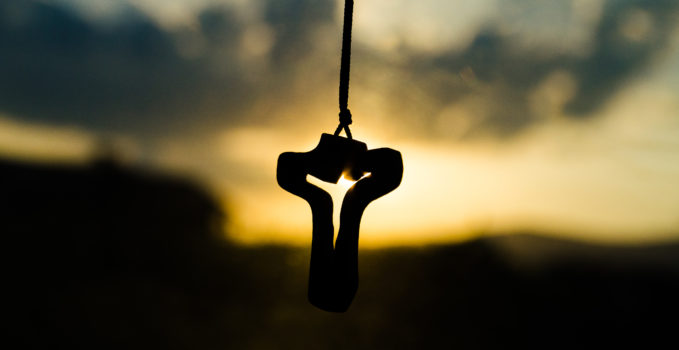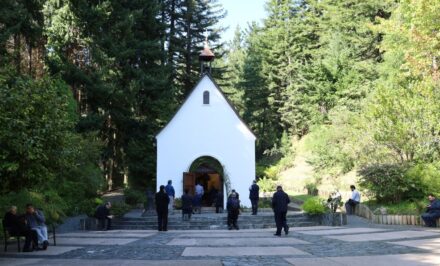Sexual abuse – now what?, Fr. Pedro Kühlcke •
Today’s Gospel[1] presents us with a very strong contrast: On the one hand we have Peter and the other apostles, who left everything and followed Jesus – they received the promise of recompense and eternal life. On the other hand is the unnamed “rich man”: he preferred his material goods to following Jesus – he remained alone with his sadness.–
In these days, we have experienced a similar, but perhaps stronger contrast: today the Pope Francisco canonized 7 people, wonderful examples of holiness in various ways of life[2]. Among them is Archbishop Oscar Romero: a bishop who left everything to follow Jesus and serve the neediest people, even to the point of giving his own life.
On the other hand, two days earlier Pope Francis ordered the dismissal from the clerical state – the strongest punishment for an ordained minister – of two Chilean bishops for the sexual abuse of minors. One of them, Francisco José Cox, is from my community, and it fills me with sadness, pain and shame. Sadness and pain when I think about the victims – how much did they have to suffer? How long did it take for “justice to be done,” if you can call it that? Shame when I think about the perpetrator, a bishop who preferred to follow disordered instincts and caused such damage, rather than follow him Jesus… shouldn’t we, as consecrated persons with all our limitations and sins, be examples of radically following Christ?
Fr. Juan Pablo Catoggio, our general superior, wrote a letter to the Schoenstatt family, where he says:
“Dear Schoenstatt Family,
Today it has become known that Pope Francis has decreed the resignation of the clerical state of Francisco José Cox Huneeus, archbishop emeritus of La Serena. The sexual abuse of minors reported in recent months, were investigated by the Congregation for the Doctrine of the Faith and led to this punishment…
We received this news with much embarrassment because of the harm done to the victims. We stand in solidarity with them and their profound suffering. Today more than ever, we deplore any act of abuse that offends the dignity of people.
We unreservedly support this decision in justice and truth, for the good of the whole Church. We reaffirm our firm willingness to collaborate with ordinary justice in all that is necessary…
The truth hurts us, but it sets us free. The path to truth and humility leads to a deep conversion and to live our Covenant of love more faithfully. We pray for victims then and for all who suffer in one way or another because of all this.”
In 2010, I preached on exactly this topic at the Youth Shrine[3], and at the time I had spoken about the importance of confronting the issue of priests who abuse minors, and all that this entails.
First of all we must make if very clear that anyone who sexually abuses a minor is committing a very grave sin. The sixth commandment speaks clearly of the good and bad use of our sexuality; but in this case it is even more serious, because it is about minors, defenseless persons who often do not even have the ability to say something about it. It is a very grave sin in the eyes of God, and is a crime that must be submitted to civil justice, without cover ups or excuses[4]. It fills every Catholic person with deep sorrow, great shame and also great disappointment, especially when it is perpetrated by priests and the religious.
Pope Francis is clear and radical in his fight against this terrible scourge that besmirches our entire Church, and especially the consecrated – we see it with these dismissals. We read that he apologised to young Spanish people who are in Rome for the Synod:
“First, I want to ask for your forgiveness for the scandals that take place within our Church, not only for the scandals of abuse, but also the scandals of worldliness, attachment to values that are not from the Gospel, of incoherence of life. You see this and say, ‘I’m becoming an atheist,’…pardon for scandalising you. I feel pain over this and I think of the mistakes made by us, the shepherds. Don’t stay away from Jesus Christ, who’s the only source of happiness.”[5]
Pope Benedict XVI, in 2010, had already written a letter to the Irish Catholics on this subject. It is a very clear and honest letter. The Pope used very strong expressions, when it speaks directly to the priests and religious who have abused children:
“You betrayed the trust that was placed in you by innocent young people and their parents. You must answer for it before Almighty God and before properly constituted tribunals. You have forfeited the esteem of the people of Ireland and brought shame and dishonour upon your confreres. … I urge you to examine your conscience, take responsibility for the sins you have committed, and humbly express your sorrow. … At the same time, God’s justice summons us to give an account of our actions and to conceal nothing.”[6]
I, personally and on behalf of my community, humbly want to apologize for our lack of authentic testimony, and I want to apologize especially to all the victims who in one way or another suffered serious damage because of members of my community.
Also, personally and as the superior of the Schoenstatt Fathers in the Paraguay, I promise myself and my community to do everything to make the spaces in which we operate – be it in the youth branches of the Movement, in our social projects, or wherever – safe and protected spaces where everyone, especially minors and vulnerable persons, are respected in their dignity and rights. We implemented the “Protocol for the prevention of sexual abuse against minors” from the Paraguayan Bishops’ Conference[7], and we want to help mitigate all the pain caused.
In light of all this, what attitudes can we adopt? I want to propose some.
First of all I want to ask tha you become are more critical of us priests, be encouraged to approach us and tell us if something does not seem right. Here in the Paraguay, there is still very much a culture of “pa’ima he’i”[8] – where one does not criticize or discuss matters with the priest. Fr. Kentenich, the founder of Schoenstatt, taught us, by his own example, the value of authentic self criticism: frank and sincere, respectful, always from the front and never from behind. Please be encouraged to tell us things from the front. How will we take it? Some betther than others. And if they really don’t listen, then – if the issue warrants it – go and speak with the corresponding superior, with the bishop. Do not be silent if the issue is serious! Help us each day to be able to convert ourselves and grow in following Christ.
On the other hand, I also want to ask for a lot of prayer and solidarity. No vocation is easy, if it is lived authentically – neither marriage, nor the consecrated life, nor the priesthood. Priests are particularly exposed, we have a special responsibility for living our vocation in Christ, even though we are simply human beings with our own burden of original sin and personal limitations. This is why we need a lot of prayer and human contact, especially those priests who are more alone. And at this time, the person who most needs our prayer is Pope Francis: he himself asked us to say a daily rosary for the Church throughout the month of October. Perhaps this situation also urges us to pray more earnestly for abundant and, above all, holy priestly vocations.
With regard to children and young people, I think that it is very important that sex education, like all education, must start in the home, with the parents themselves. Do not leave such decisive issues to the school, the Internet, or the streets! Shame and taboo are the worst counselors. Fathers and mothers, talk about these issues with your children before they learn about this from the outside; teach them to defend themselves and encourage them to speak out! If a girl or a boy comes to his mom or dad and says to them: “I feel uncomfortable, strange with this person,” take them seriously, do not say to them: “Stop talking nonsese,” because it could possibly be something serious. Remember that most cases of child abuse happen in the home environment.
In relation to our faith and our Church, we may ask ourselves: “Why should I keep believing, why should I remain in such a sinful Church?”. We must remember that even among the twelve apostles there was a Judas who betrayed Jesus. There have always been and there will always be traitors, but Church continues to be a sign and presence of Christ. In the Church there were and are bishops, priests, religious and lay criminals and abusers, but there were and still are also many saints like the seven who were canonized today in the Vatican.
That through the intercession of the Saint Bishop Oscar Romero, St. Roque Gonzáles and Blessed Maria Felicia, Chiquitunga, may our Church in Paraguay and the whole world, and our Schoenstatt Movement increasingly better reflect the radical following of Christ like the apostles and the saints.
Fr. Pedro Kühlcke, Homily 14/10/2018, Tupãrenda
[1]… 28th Sunday, Year B, Mk 10:17-30
[2]…https://www.vaticannews.va/en/pope/news/2018-10/canonization-paul-vi.html
[3]…Homily on 18 April 2010.
[4] Cfr. http://www.zenit.org/article-35189?l=spanish
[5] https://es.aleteia.org/2018/10/13/el-papa-pide-perdon-por-los-escandalos-a-grupo-de-jovenes-espanoles/
[6]…Pastoral Letter of the Holy Father Pope Benedict XVI to the Catholics of Ireland, 19 March 2010, 7: To priests and religious who have abused children. Cfr. http://w2.vatican.va/content/benedict-xvi/en/letters/2010/documents/hf_ben-xvi_let_20100319_church-ireland.html
[7] http://episcopal.org.py/protocolo/protocolo.pdf
[8]…Guarani expression that implies: the priest has spoken, end of discussion.
Original: Spanish, 15 October. Translation: Sarah-Leah Pimentel, Cape Town, South Africa.














